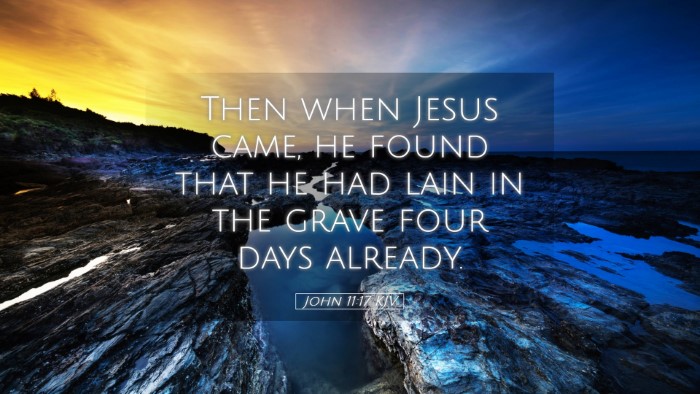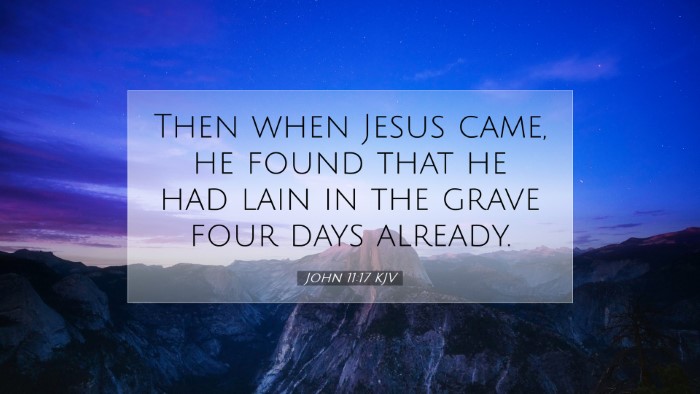Commentary on John 11:17
Verse: "So when Jesus came, He found that he had already been in the tomb four days."
Contextual Overview
This verse is situated within the narrative of the resurrection of Lazarus, which illustrates profound themes of life, death, and the divine authority of Jesus Christ. To fully grasp the significance of this event, it is crucial to understand the surrounding circumstances and theological implications.
Matthew Henry's Commentary
Matthew Henry emphasizes the weight of the situation presented by the four-day delay. He notes that this detail is significant because it underscores the reality of Lazarus’s death, dispelling any thoughts that he might have merely been sleeping or in a state of temporary unconsciousness. Henry points out:
- The Certainty of Death: The four days signify a complete and undeniable state of death, reinforcing the truth that Jesus has authority over life and death.
- Divine Timing: Jesus' timing is perfect; He arrives at the moment when the miracle would be most impactful, demonstrating His sovereignty and power.
- Mourning and Grief: The delay allows the fullness of grief to be appreciated, thus setting the stage for an extraordinary display of His divine glory when Lazarus is raised.
Albert Barnes' Insights
Albert Barnes provides additional layers of understanding in his commentary, focusing on the nature of belief and the purpose behind the events:
- Stated Purpose: Jesus states earlier that this illness is not unto death but for the glory of God (John 11:4). Barnes emphasizes that the divine purpose behind events is often revealed in unexpected ways.
- Encouragement for Faith: The delay invites believers to deepen their faith. By allowing Lazarus to remain in the tomb, Jesus prepares the witnesses for a greater demonstration of His power.
- Revelation of His Nature: Barnes articulates that this event reveals the dual nature of Christ—fully divine and fully human—allowing Him to empathize with human suffering while also commanding the power of resurrection.
Adam Clarke's Contribution
Adam Clarke provides a critical perspective on the cultural and historical context of the event, along with its theological implications:
- Jewish Practices: Clarke notes that in Jewish customs, the body was typically interred immediately and mourning lasted several days. The four-day period intensifies the cultural significance, showing a clear break from life.
- Reaction to Death: He discusses the normalcy of mourning during this time, reflecting on how the people’s despair highlights the miraculous nature of Jesus' intervention.
- Sign of the Resurrection: Clarke also underscores that Jesus’ actions point forward to His own resurrection, providing a precursor of the ultimate hope that believers have through Christ.
Theological Reflections
The implications of John 11:17 extend far beyond the historical narrative. The awareness of Lazarus being dead for four days invites a meditation on the broader theological concepts such as:
- The Reality of Death: The certainty of death remains a universal experience for humanity, yet this passage promises the reality of resurrection through Christ.
- God's Sovereignty: Believers can find comfort in knowing that God’s timing is not always aligned with human expectations. His purposes are often revealed in delay.
- The Nature of Faith: The events leading up to this moment emphasize faith as not merely assent to facts but as a deep relational trust in Jesus despite circumstances.
Application for Today
For pastors, theologians, and students of the Word, John 11:17 provides rich material for preaching and teaching:
- Encouragement in Trials: In their application, leaders can encourage congregants facing despair to trust in the timing and power of God, as He is always able to bring life from death.
- Preaching the Resurrection: The resurrection narrative offers hope not just for physical resurrection but spiritual rebirth, forging a deeper understanding of salvation.
- Community Mourning: Pastoral care can be modeled through acknowledgment of grief and loss, leading to the ultimate hope found in Jesus.
Conclusion
In summary, John 11:17 is not merely a historical account but a vivid exploration of Christ's authority over life and death, the nature of belief, and the deep compassion He extends to those who mourn. The insights from Matthew Henry, Albert Barnes, and Adam Clarke collectively enrich our understanding, providing profound theological reflections and practical applications that resonate with Christian faith and practice today.


